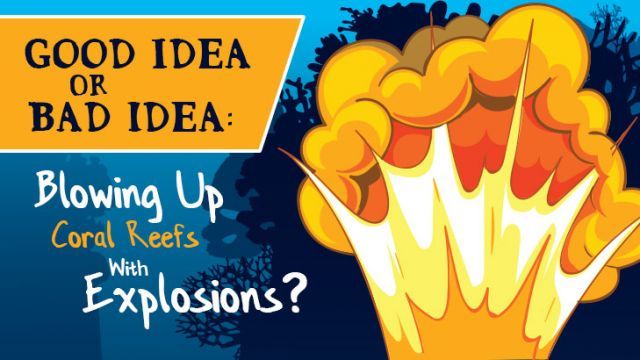
Late last year, the Wildlife Conservation Society (WCS) was attempting to study vocalizations of whales and dolphins off the coast of Tanzania, but something kept distracting the researchers: the sounds of people blowing up coral reefs with homemade explosives.
Blast fishing is one of the most unsustainable and inefficient practices that has ever existed, and it is still prevalent today despite being illegal in most countries. In the Philippines, one can be sentenced to as much as 10 years in prison if found guilty of blast fishing, yet still there are blast fishing operations occurring off the country’s coast.
It’s not a shock that blast fishing still occurs despite widespread knowledge of the environmental impacts, as it can be a fast and efficient way for someone to earn some money.
Here’s how your typical blast fishing expedition goes:
- Usually a homemade, kerosene-based explosive is thrown into the water.
- After the blast, some of the dead fish will float to the top.
- The fish are collected and taken to market.
The explosive used can be made for as little as 2 dollars and a single blast can net over 2,500 fish. From a purely short-term economic perspective, it is a fantastic way to earn a living. From all other angles, however, it is a terrible practice that should never be used by anyone, ever, for the rest of time.
After a blast, only 10 percent of the fish killed will float to the top and be collected, the rest of the fish will sink to the sea floor. Of course, it isn’t just the fish that are harmed by the explosions: All marine life in the area is impacted.
The materials used in the explosives also are detrimental to marine life. Kerosene and fertilizer from the homemade explosives pollute the water.
Coral reefs, which are already endangered, are also greatly impacted by blast fishing. In Tanzania, the coral reefs play an important role in tourism and fisheries, but frequent blast fishing threatens their survival. Repeated blast fishing in an area can turn coral reefs to rubble, creating a desert in the water where life used to flourish.
Blast fishing is also an incredibly shortsighted practice for those who rely on healthy fisheries in the area. By only being able to collect 10 percent of what they kill, blast fishing practitioners are doing harm to their own stock, preventing fish from being able to reproduce and replenish their own numbers, greatly reducing the ability of future fishermen to make a living in the area. Not only does blast fishing harm fish populations directly, but by also polluting the water and damaging the coral reefs, blast fishing harms the entire area’s ability to support marine life.
In Tanzania, where blast fishing was occurring at such a rate that it actually prevented the studying of other underwater sounds, the practice is illegal but widely used. As part of an educational campaign, the World Wildlife Fund (WWF) has been hoping to mobilize communities nearby to increase awareness of the environmental impacts of blast fishing. Marine project officer with the WWF, Edgar Kipoki, believes that people in positions to prevent the prosecution of blast fishing offenders are turning a blind eye, either out of apathy or corruption.
“Dynamite use in fishing has for some time reduced but is bouncing back because raw materials are readily available, innovation has increased and they are now using explosives that don’t make noise and authorities are not doing enough to shut down the markets,” said Kipoki.
Are the fishermen to blame, or are they victims of circumstance? Some argue that blast fishing is so detrimental to the environment that fishermen are acting out of pure selfishness and greed. Others suggest that many of the fishermen who use explosives do so out of desperation, and that if a more economically viable way for them to earn a living was available, they would use it. The counterargument is that some fishermen do in fact use sustainable fishing practices in those areas, while others choose to engage in the more destructive fishing practice.
To further compound the problem, more sustainable fishing practices are becoming increasingly difficult in the area because of the damage from previous blast fishing, making this practice the only option for fishermen to earn a living.
This dilemma exists in other areas as well. For instance, many species of wildlife are endangered due to poaching, but often there are not readily available alternatives for people to earn a living doing something else. In the absence of other means to provide for themselves and their families, do they have a choice?
Blast fishing and poaching are two prime examples of why a solution to environmental degradation must involve solutions to poverty.
—Ian Carey

